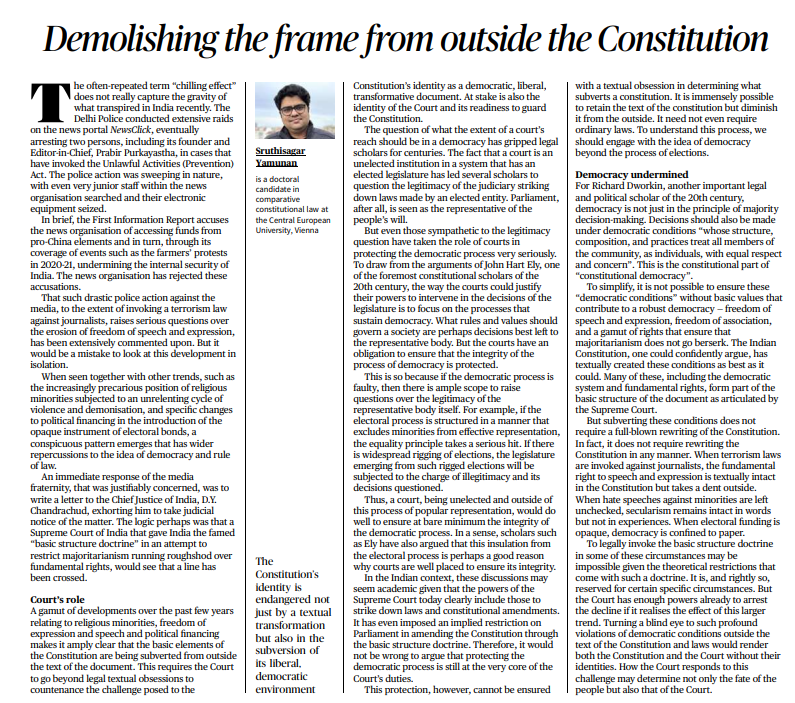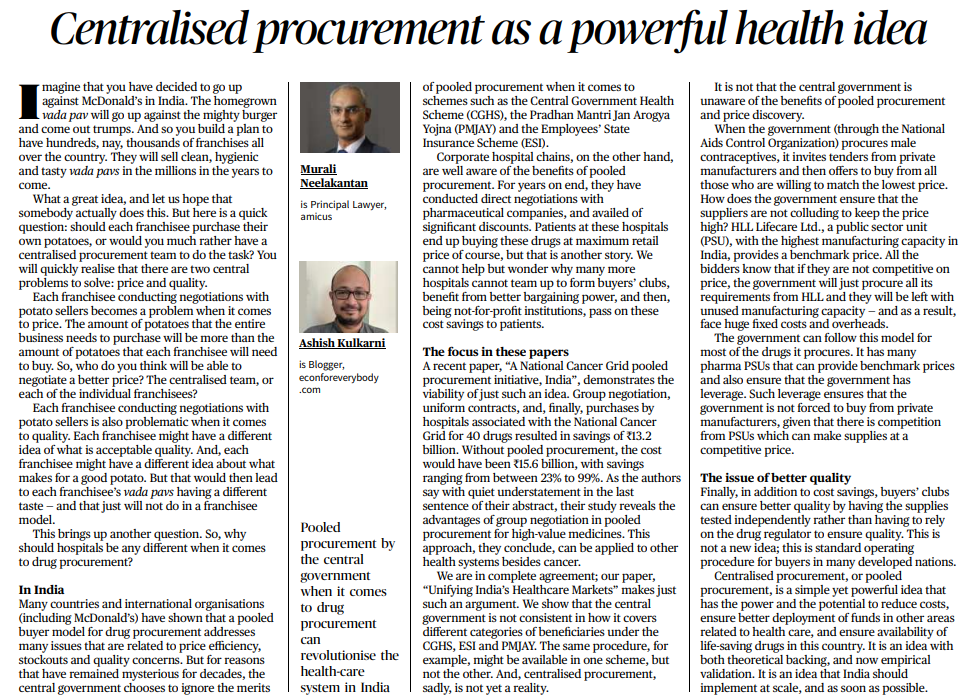Introduction:
- The recent events in India, involving extensive police raids on the news portal NewsClick and the arrest of its founder and Editor-in-Chief, Prabir Purkayastha, have raised serious concerns about freedom of speech and expression.
- These actions, invoking the Unlawful Activities (Prevention) Act, have sent shockwaves through the media fraternity.
- However, this incident is not an isolated one but part of a larger pattern that threatens democracy and the rule of law in India.
The Erosion of Freedom:
- The First Information Report accuses NewsClick of receiving funds from pro-China elements and undermining India’s internal security through its coverage of events like the farmers’ protests.
- NewsClick has denied these allegations, but the drastic police action against journalists and the use of a terrorism law for these cases seriously erode freedom of speech and expression.
Religious Minorities and Political Financing:
- When viewed alongside other concerning trends, such as the precarious position of religious minorities facing violence and demonization, and the introduction of electoral bonds in political financing, a discernible pattern emerges.
- This pattern has far-reaching implications for the idea of democracy and the rule of law in India.
The Call for Judicial Intervention:
- In response to these developments, media professionals have written a letter to the Chief Justice of India, D.Y. Chandrachud, urging judicial intervention.
- They hope that the Supreme Court, which previously established the “basic structure doctrine” to safeguard fundamental rights, will take note of this disturbing trend.
The Role of the Courts in Democracy:
- The role of the courts in a democracy has been a subject of debate for centuries.
- While unelected, they play a vital role in protecting the democratic process.
- Courts need to ensure that the integrity of the democratic process is maintained, as a flawed process can raise questions about the legitimacy of elected bodies.
Protecting Democracy from Within and Outside:
- The Supreme Court of India holds the power to strike down laws and constitutional amendments, and it has enforced the basic structure doctrine.
- However, protecting democracy goes beyond textual interpretations of the constitution. It involves safeguarding fundamental values like freedom of speech, expression, and association.
Democracy Beyond Elections:
- Legal scholar Richard Dworkin emphasized that democracy is not just about majority decision-making; it also requires democratic conditions that treat all individuals with equal respect and concern.
- These conditions are maintained by preserving rights and values like freedom of speech, secularism, and ensuring that majoritarianism doesn’t run rampant.
Preserving Democratic Conditions:
- Subverting democratic conditions doesn’t always require a constitutional rewrite but can be achieved through actions that circumvent the text of the Constitution.
- When terrorism laws are used against journalists, hate speeches against minorities go unchecked, or electoral funding remains opaque, democracy is undermined.
The Role of the Court:
- While applying the basic structure doctrine may not always be feasible, the Supreme Court has sufficient powers to address the decline in democratic conditions.
- Ignoring these violations outside the legal text would compromise the identities of both the Constitution and the Court.
How the Court responds to these challenges will significantly impact the fate of the people and the Court itself.
Introduction
- India has been reluctant to adopt a pooled buyer model for drug procurement in its healthcare schemes, despite the success of this approach in other countries and industries.
- The editorial highlights the benefits of centralized drug procurement, emphasizing the potential for cost savings, improved quality, and uniformity in drug procurement and distribution.
Centralized vs. Decentralized Procurement
- Price Efficiency: Centralized procurement, where a central team negotiates with suppliers, offers significant advantages in terms of price efficiency. The sheer volume of drugs required by the entire healthcare system allows for more substantial negotiations and better prices than individual franchisees or hospitals can achieve.
- Quality Concerns: With decentralized procurement, individual franchisees or hospitals may have varying standards for drug quality, leading to inconsistencies in patient care.
- A centralized model ensures uniformity in drug quality and standards, vital for maintaining a consistent healthcare experience.
Pooled Procurement in Corporate Hospitals
- Corporate hospital chains in India have recognized the benefits of centralized procurement, forming direct negotiations with pharmaceutical companies to secure significant discounts.
- However, these savings are not typically passed on to patients, raising questions about the ethical use of such cost advantages.
The National Cancer Grid Initiative
- The “National Cancer Grid pooled procurement initiative” serves as a real-world example of the benefits of centralized procurement in healthcare.
- By negotiating as a group, using uniform contracts and bulk purchases, associated hospitals saved ₹2 billion, demonstrating potential savings ranging from 23% to 99%.
- This approach is not limited to cancer drugs and can be extended to various health systems.
Inconsistent Government Schemes
- The central government’s healthcare schemes, including the Central Government Health Scheme (CGHS), the Pradhan Mantri Jan Arogya Yojna (PMJAY), and the Employees’ State Insurance Scheme (ESI), lack consistency in how they cover different categories of beneficiaries.
- The absence of centralized procurement is a notable shortcoming in these schemes.
Government’s Role in Centralized Procurement
- The government can adopt a model similar to the one used for male contraceptives procurement.
- By inviting tenders and setting benchmark prices with the help of pharma Public Sector Units (PSUs), it can ensure competitive pricing and deter private manufacturers from collusion, ultimately benefiting patients.
Ensuring Quality through Independent Testing
- Buyers’ clubs can enhance quality assurance by independently testing supplies, reducing reliance on the drug regulator for quality control.
- This practice aligns with international standards and enhances the overall healthcare system.
Conclusion
Centralized drug procurement, or pooled procurement, offers a simple yet potent solution to reduce costs, optimize resource allocation, and ensure the availability of life-saving drugs in India.
The success of the National Cancer Grid Initiative illustrates its practical benefits. India should implement centralized procurement on a larger scale to achieve better healthcare outcomes, both in terms of cost-effectiveness and quality standards.
Read on your Own




